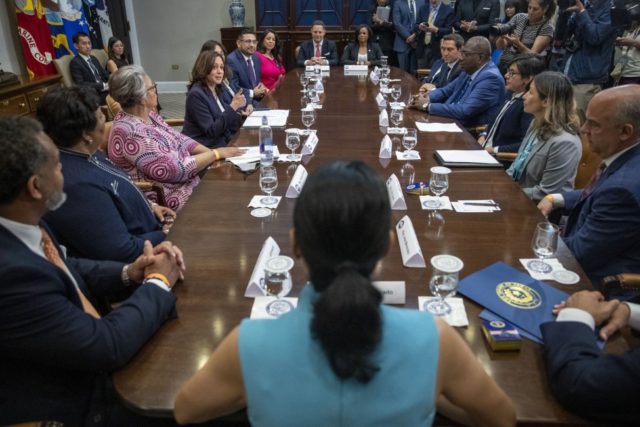Sept. 7 (UPI) — Texas Gov. Greg Abbott signed a bill into law Tuesday placing new restrictions on voting.
The signing into law of Senate Bill 1 adds new restrictions to early voting and new identification requirements, which critics say will disproportionately impact voters of color.
Abbott praised the new law upon signing it.
“It does make it easier than ever before for anybody to go cast a ballot,” Abbott said at an event where he signed the bill, CNN reported. “It does also, however, make sure it is harder than ever for people to cheat at the ballot box.”
In particular, new voting limits in the law target Harris County, a Democratic county, which has a higher percentage of Black and Hispanic people than the state as a whole.
Officials had widened access to the ballot there last year by creating overnight early voting to accommodate voters working during regular hours and drive-through voting, the Texas Tribune reported, but the new law has rolled back those initiatives.
The law also creates new rules and penalties for assisting others who fill out a registration form or ballot, which could makes it harder for people with disabilities or language barriers to vote, The Washington Post reported. It also requires large Texas counties that lean Democratic to live stream video at ballot-counting sites, The New York Times reported.
Texas is one of several Republican-leaning states that have pushed for new voting restrictions after former President Donald Trump espoused baseless voter fraud allegations in the 2020 election.
Florida Gov. Ron DeSantis signed restrictive voting bill into law in May, and Georgia Gov. Brian Kemp enacted sweeping changes to the state’s election rules in March. The new restrictions have prompted national attention and lawsuits in all three states.
“Reforms are needed to the election laws of this state to ensure that fraud does not undermine the public confidence in the electoral process,” the text of Texas’ SB 1 states.
“The common-sense reforms in the legislation strengthen our trust in the electoral process, from voter registration through the final tallying of ballots,” the bill’s author, Republican state Sen. Bryan Hughes told CNN. “Texans can cast their votes with confidence knowing that they’ll be counted and reported accurately.”
Democrats had brought the Texas Legislature to a standstill for nearly six weeks over concern about barriers in the Senate bill to voters of color and voters with disabilities. Texas’ Republican-controlled House passed the bill on Aug. 27 after enough Democrats returned to the chamber earlier that month.
The NAACP Legal Defense Fund announced a lawsuit shortly after the signing, stating the law will make it more difficult for Texas residents to vote and “disenfranchise some altogether” including Black and Latino voters and voters with disabilities.
“Despite Texas legislators’ repeated and disingenuous attempts to cite ‘voter fraud’ as their reasoning for implementing S.B. 1, it is clear as day that this law was created to suppress votes,” LDF Assistant Counsel Georgina Yeomans said. “Rather than expand voting access, elected officials are making it harder for Texans to vote — especially voters of color, who will be disproportionately burdened. S.B. 1 was intentionally designed to have that effect.”
The American Civil Liberties Union of Texas, which has described the bill as “voter suppression,” vowed to sue.
“This law is unconstitutional and anti-democratic,” the ACLU tweeted. “Texas — we’ll see you in court.”
Marc Elias, a lead Democratic elections lawyer, announced the filing of a separate lawsuit “4 minutes and 3 seconds after Abbott signed the bill into law,” which alleges the bill limits minority voters’ access to the ballot on purpose in violation of the Voting Rights Act, along with placing an “undue burden” on voting in violation of constitutional amendments.
And The League of United Latin American Citizens, the nations oldest and largest Latino civil rights organization, announced that it had also sued the state requesting injunctive relief against the new law, which the group says violates the first and 14th Amendments of the Constitution.
“Texas voters deserve fair, open and transparent elections, not a process rigged to deny our communities, whose numbers are growing, the right to vote,” LULAC National President Domingo Garcia said in a statement.

COMMENTS
Please let us know if you're having issues with commenting.